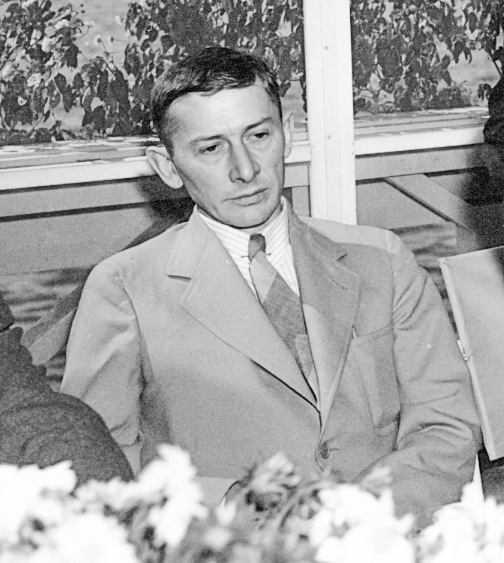
The Red Scare and McCarthyism swept the country in the 1950s, bringing with it a wave of fear toward communism. This fear did not bypass Lafayette’s campus.
One man, the college librarian, challenged Lafayette’s anti-communist stance: Theodore “Ted” Norton, himself an alleged communist.
A Jan. 15, 1953 op-ed by The Easton Express accused Norton of promoting a national campaign, “Save the Rosenbergs,” regarding Julius and Ethel Rosenberg, convicted Soviet spies sentenced to death.
The Express claimed Norton printed 150 copies of pamphlets denouncing the death penalty for the Rosenbergs and mailed them, unsolicited, to various people. Norton denied this accusation.
However, the paper continued to report on Norton’s communist ties into 1954.
On Jan. 18, 1953, Norton sent a letter to the president of the college, Ralph Cooper Hutchinson, and thanked him for standing up for his opinions. Norton contended that the article by the Express was a personal attack and that the intended purpose of the Rosenberg pamphlets was to promote a “balanced, considered judgment of the principles involved in the Rosenbergs’ appeal for clemency.”
Hutchinson replied the next day, saying Norton had a history of lending the impression that he was a communist and his presence on campus was a “great burden and major difficulty,” despite how unjust the impression was.
In a Feb. 12, 1953 letter from Hutchinson to Norton, Hutchinson requested Norton refrain from public activities of any kind, exempting the American Friends of Lafayette, or AFL, in which he was “doing a fine job.” Norton was a founding member and the first secretary-treasurer of AFL, which honors the legacy of the Marquis de Lafayette.
However, the AFL was also concerned about Norton. In a May 2, 1953 letter, Stuart W. Jackson, another founding member, noted that Norton was disrupting the society and could not remain a member. He suggested that they elect a new secretary and treasurer at the next meeting to oust Norton from leadership. Per a May 28, 1953 letter from AFL president Messmore Kendall to Hutchinson, Norton was not re-elected.
In a letter from June 3, 1953, Hutchinson replied to Kendall. “I think you have done quite the right thing in removing him as Secretary and Treasurer in view of his activity in behalf of the Rosenbergs,” Hutchinson wrote.
Hutchinson went on to say that removing Norton from his position at Lafayette College was complicated.
“We discover no evidence that he is actually a Communist,” Hutchinson wrote. However, Hutchinson made an ultimate decision.
“Remove Mr. Norton’s name from your papers or from any direct responsibility to the society,” he wrote. Official AFL records confirm that Norton’s name was not wiped, however.
Norton’s story was far from over. On Oct. 13, 1954, undercover FBI agent Herman Thomas identified Ted Norton as a member of the Communist Party to the Senate Internal Security Committee, per the October issue of “The Lafayette Alumnus.” Norton denied this, which Hutchinson and the Board of Trustees accepted, in light of no clear proof.
In a letter on Oct. 15, 1954, Hutchinson urged Norton to testify before Congress and placed him under special directions to answer all questions truthfully, not to use legal counsel or a civil liberties organization and not to take refuge in the Fifth Amendment.
“As President of the College, [I] direct you to file with the above named committee an empathetic and unequivocal denial,” Hutchinson wrote.
Hutchinson directed Norton to also have these letters, or the denials, in the mail no later than the evening of Oct. 19. Hutchinson advised the Senate committee chairman and newspaper editors, telling them they can expect Norton’s letter on Oct. 20. The president considered failing to do so a “defiance of the College Administration.”
On Oct. 18, 1954, Norton wrote to Hutchinson saying his Oct. 15 letter was “an affront” to him and the faculty.
“For you to ‘direct’ me in such fashion violates my rights as a faculty member and a citizen,” Norton wrote.
Norton then provided his resignation.
“Your concept of the relationship of a faculty member at Lafayette College to your administration is so foreign to my understanding of what that relationship ought to be that I hereby tender my resignation as Associate Professor and Librarian of Lafayette College, effective Oct., 19, 1954,” Norton wrote. “I look forward to the day when the college administration will accord to the faculty that measure of respect for the professional status of its members to which our tradition of academic freedom entitles each one.”
Norton, a 23-year member of the faculty, went on to plead the Fifth Amendment. In an Oct. 19, 1954 letter to Norton, Hutchinson gratefully accepted his resignation and added, “Your administration of the library has not been satisfactory.”
According to the faculty meeting minutes after these events transpired, the faculty voted to disagree with Hutchinson, saying, “By his efforts, the library has become a modern and effective auxiliary of the college’s scholastic life.”
The faculty also “regret[ted] Hutchinson’s tone in his Oct. 15 letter.” Yet, they concluded Norton’s academic freedom and rights as a citizen were not violated.



































































































